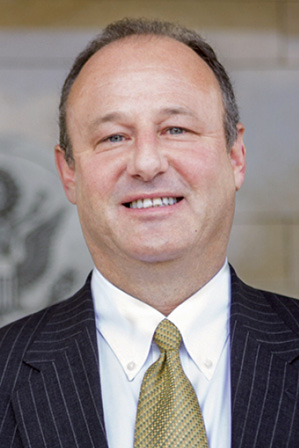We Defend the Foreign Service
President’s Views
BY ERIC RUBIN

There are many reasons to be a member of the American Foreign Service Association. AFSA advances the cause of diplomacy, lobbies the Congress for resources for foreign affairs and foreign assistance, and offers a wealth of benefits—from The Foreign Service Journal and the daily AFSA Media Digest to topical programming on a host of subjects.
AFSA has another important role, however, one that is especially important today. As the legal bargaining representative of all Foreign Service professionals in six U.S. government agencies, our job is to work to improve working conditions and policies on employment, promotion, discipline and retirement.
This role comes with an important imperative: We defend our members, and we defend the Foreign Service as a whole. When you join AFSA, we take on an obligation to defend you when you need us. Several hundred members a year turn to us for individual support, and our team of lawyers, labor management advisers and grievance counselors goes to bat for them.
AFSA also helps arrange outside expert support when needed. In recent months, we have had to ramp up our support to members in the wake of the political turbulence that has affected too many of our colleagues.
As we approach the 100th anniversary of the modern Foreign Service and of AFSA, it’s worth looking back on our history to derive lessons that can help us respond to the very challenging times that face us today.
In the difficult early days of the Cold War, Foreign Service officers who reported accurately on the likely collapse of Chiang Kai-shek’s Nationalist government in China and the probable victory of the communists were pilloried in the press and dragged through lengthy congressional hearings. Foreign Service Officers O. Edmund Clubb, John Paton Davies Jr., John S. Service and John Carter Vincent were forced out of the Foreign Service.
During the worst days of Senator Joseph McCarthy’s rampage against alleged Soviet sympathizers in the U.S. government, AFSA did little to defend members of the Foreign Service who were unfairly accused of being “fellow travelers” or Soviet sympathizers and also did little to protest raids on U.S. Information Agency libraries overseas that sought to purge them of “disloyal” books.
Other members of the Foreign Service were driven out during the 1950s “Lavender Scare” purge of suspected gay employees, a campaign that the Secretary of State formally apologized for on behalf of the State Department in 2017.
During the tumultuous years of the Vietnam War, AFSA members transformed our association from a partner with management to an independent advocate for the U.S. Foreign Service and its employees. In 1973 when AFSA, long a professional association, became the official bargaining agent for the Foreign Service, it gained the power to protect members of the Service against harassment and retaliation—not just as a matter of professional integrity, but also as a matter of employee rights.
This legacy is part of our history, and we need to remember it and draw lessons from it. Our message must be simple and clear: We have your back, and we will assist and defend you when you need help. Nothing we do is more important.
We also must maintain AFSA’s impartiality and non-partisan, non-political orientation. We don’t take sides in political or policy battles. We support the fundamental vision of a Foreign Service that is committed to the success of the policies established by our elected leaders.
There are, however, two sides to that coin: We expect our elected and appointed leaders to respect the career professionals of the Foreign Service and to recognize their commitment to serving the United States and to honoring their oath to the U.S. Constitution.
We also expect them to refrain from equating well-considered dissent for disloyalty. Constructive dissent must be confidential, never public; and dissenters must accept that at the end of the day our policy will be set by our elected leaders. To achieve good policy decisions, however, it is critical that our expert career professionals have a role in policy formation.
That is the vision of the Foreign Service Act of 1980, which puts the Foreign Service at the heart of our nation’s foreign policy decision-making. That is the vision that inspires our work.

